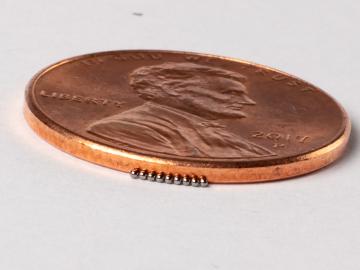
Filter News
Area of Research
- Advanced Manufacturing (3)
- Biology and Environment (24)
- Computational Biology (1)
- Computational Engineering (2)
- Computer Science (3)
- Energy Science (24)
- Fusion and Fission (5)
- Fusion Energy (7)
- Isotope Development and Production (1)
- Isotopes (5)
- Materials (25)
- Materials for Computing (5)
- Mathematics (1)
- National Security (12)
- Neutron Science (14)
- Nuclear Science and Technology (12)
- Nuclear Systems Modeling, Simulation and Validation (1)
- Quantum information Science (4)
- Supercomputing (34)
News Type
News Topics
- (-) Advanced Reactors (25)
- (-) Biomedical (28)
- (-) Cybersecurity (20)
- (-) Microelectronics (1)
- (-) Quantum Science (43)
- (-) Space Exploration (13)
- 3-D Printing/Advanced Manufacturing (82)
- Artificial Intelligence (51)
- Big Data (25)
- Bioenergy (42)
- Biology (47)
- Biotechnology (14)
- Buildings (36)
- Chemical Sciences (48)
- Clean Water (16)
- Composites (23)
- Computer Science (105)
- Coronavirus (28)
- Critical Materials (23)
- Education (3)
- Element Discovery (1)
- Emergency (1)
- Energy Storage (75)
- Environment (86)
- Exascale Computing (14)
- Fossil Energy (2)
- Frontier (17)
- Fusion (26)
- Grid (38)
- High-Performance Computing (44)
- Hydropower (6)
- Irradiation (2)
- Isotopes (25)
- ITER (5)
- Machine Learning (27)
- Materials (96)
- Materials Science (90)
- Mathematics (3)
- Mercury (5)
- Microscopy (28)
- Molten Salt (8)
- Nanotechnology (41)
- National Security (21)
- Neutron Science (81)
- Nuclear Energy (47)
- Partnerships (33)
- Physics (30)
- Polymers (23)
- Quantum Computing (18)
- Security (13)
- Simulation (19)
- Statistics (2)
- Summit (30)
- Transportation (62)
Media Contacts

Researchers at the Department of Energy’s Oak Ridge National Laboratory have received five 2019 R&D 100 Awards, increasing the lab’s total to 221 since the award’s inception in 1963.

A joint research team from Google Inc., NASA Ames Research Center, and the Department of Energy’s Oak Ridge National Laboratory has demonstrated that a quantum computer can outperform a classical computer

The U.S. Department of Energy announced funding for 12 projects with private industry to enable collaboration with DOE national laboratories on overcoming challenges in fusion energy development.

In a recent study, researchers at Oak Ridge National Laboratory performed experiments in a prototype fusion reactor materials testing facility to develop a method that uses microwaves to raise the plasma’s temperature closer to the extreme values

Three researchers at Oak Ridge National Laboratory will lead or participate in collaborative research projects aimed at harnessing the power of quantum mechanics to advance a range of technologies including computing, fiber optics and network

Using additive manufacturing, scientists experimenting with tungsten at Oak Ridge National Laboratory hope to unlock new potential of the high-performance heat-transferring material used to protect components from the plasma inside a fusion reactor. Fusion requires hydrogen isotopes to reach millions of degrees.

Using the Titan supercomputer at Oak Ridge National Laboratory, a team of astrophysicists created a set of galactic wind simulations of the highest resolution ever performed. The simulations will allow researchers to gather and interpret more accurate, detailed data that elucidates how galactic winds affect the formation and evolution of galaxies.

Scientists at Oak Ridge National Laboratory studying quantum communications have discovered a more practical way to share secret messages among three parties, which could ultimately lead to better cybersecurity for the electric grid

Oak Ridge National Laboratory physicists studying quantum sensing, which could impact a wide range of potential applications from airport security scanning to gravitational wave measurements, have outlined in ACS Photonics the dramatic advances in the field.

For the first time, Oak Ridge National Laboratory has completed testing of nuclear fuels using MiniFuel, an irradiation vehicle that allows for rapid experimentation.


